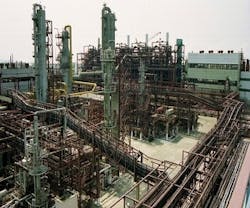Secretary Chu Tasks Leaders with Natural Gas Best Practices
U.S. Energy Secretary Steven Chu has announced that a group of environmental, industry, and state regulatory experts will be behind recommendations to improve safety and performance of natural gas hydraulic fracturing from shale formations.
Hydraulic fracturing or “fracking” has become increasingly more visible in the public spotlight due to health concerns over potentially unsafe drinking water.
"America's vast natural gas resources can generate many new jobs and provide significant environmental benefits, but we need to ensure we harness these resources safely," says Secretary Chu. "I am looking forward to hearing from this diverse, respected group of experts on best practices for safe and responsible natural gas production."
The list of qualified professionals involved with the project is as follows:
John Deutch, Institute Professor at MIT (Chair)
John Deutch served as Director of Energy Research, Acting Assistant Secretary for Energy Technology and Under Secretary of Energy for the U.S. Department of Energy in the Carter Administration and Undersecretary of Acquisition & Technology, Deputy Secretary of Defense and Director of Central Intelligence during the first Clinton Administration. Dr. Deutch also currently serves on the Board of Directors of Raytheon and Cheniere Energy and is a past director of Citigroup, Cummins Engine Company and Schlumberger. A chemist who has published more than 140 technical papers in physical chemistry, he has been a member of the MIT faculty since 1970, and has served as Chairman of the Department of Chemistry, Dean of Science and Provost.
Stephen Holditch, Head of the Department of Petroleum Engineering, Texas A&M University
Stephen Holditch serves as Head of Texas A&M's Harold Vance Department of Petroleum Engineering and serves on the Boards of Directors of Triangle Petroleum Corporation and Matador Resources Corporation Texas. In 1977, Dr. Holditch founded S.A. Holditch & Associates, a petroleum technology consulting firm which provided analysis of low permeability gas reservoirs and designed hydraulic fracture treatments. He served as president of the company until it was bought by Schlumberger in 1997. Dr. Holditch has worked for Schlumberger, Shell Oil Company and Pan American Petroleum Corporation.
Fred Krupp, President, Environmental Defense Fund
Fred Krupp has overseen the growth of EDF into a recognized worldwide leader in the environmental movement. Krupp is widely acknowledged as the foremost champion of harnessing market forces for environmental ends. He also helped launch a corporate coalition, the U.S. Climate Action Partnership, whose Fortune 500 members - Alcoa, GE, DuPont and dozens more - have called for strict limits on global warming pollution. Mr. Krupp is coauthor, with Miriam Horn, of New York Times Best Seller, Earth: The Sequel. Educated at Yale and the University of Michigan Law School, Krupp was among 16 people named as America's Best Leaders by U.S. News and World Report in 2007.
Kathleen McGinty, Former Secretary of the Pennsylvania Department of Environmental Protection
Kathleen McGinty is a respected environmental leader, having served as President Clinton's Chair of the White House Council on Environmental Quality and Legislative Assistant and Environment Advisor to then-Senator Al Gore. More recently, she served as Secretary of the Pennsylvania Department of Environmental Protection and as Chair of the Pennsylvania Energy Development Authority. Ms. McGinty is Senior Vice President of Weston Solutions, Inc. and a Director at NRG Energy.
Susan Tierney, Managing Principal, Analysis Group
Susan Tierney is chairman of the Board of the Energy Foundation, and serves on the Boards of Directors of the World Resources Institute and the Clean Air Task Force. Until recently, she was a co-chair of the National Commission on Energy Policy. Currently, she chairs the National Petroleum Council Policy Subgroup's study of North American natural gas and oil resources. Dr. Tierney served as Assistant Secretary for Policy at the U.S. Department Energy during the Clinton Administration. In Massachusetts, she served as Secretary of Environmental Affairs, Chair of the Board of the Massachusetts Water Resources Agency, Commissioner of the Massachusetts Department of Public Utilities and executive director of the Massachusetts Energy Facilities Siting Council.
Daniel Yergin, Chairman, IHS Cambridge Energy Research Associates
Daniel Yergin is the co-founder and chairman of IHS Cambridge Energy Research Associates. He is a member of the Board of the United States Energy Association and a member of the U.S. National Petroleum Council. He has chaired the U.S. Department of Energy's Task Force on Strategic Energy Research and Development. Dr. Yergin is also CNBC's Global Energy Expert and the author of the Pulitzer Prize-winning book, The Prize: The Epic Quest for Oil, Money and Power.
Mark Zoback, Professor of Geophysics, Stanford University
Mark Zoback is the Benjamin M. Page Professor of Geophysics at Stanford University. He was co-principal investigator of the San Andreas Fault Observatory at Depth project (SAFOD) and has been serving on a National Academy of Engineering committee investigating the Deepwater Horizon accident. He was the chairman and co-founder of GeoMechanics International and serves as a senior adviser to Baker Hughes, Inc. Prior to joining Stanford University, he served as chief of the Tectonophysics Branch of the U.S. Geological Survey Earthquake Hazards Reduction Program.
Immediate goals for the group? Within 90 days of beginning their work, identify any immediate steps that can be taken to improve the safety and environmental performance of hydraulic fracturing.
They have also been tasked within six months of beginning their work to provide recommended advice to the agencies on practices for shale extraction to ensure the protection of public health and the environment.
Hydraulic Fracturing Up for Review
